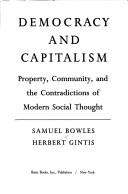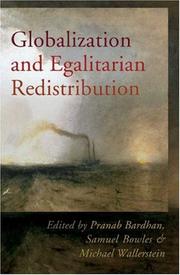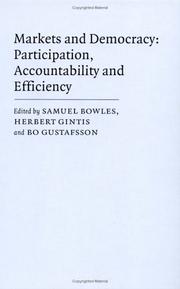| Listing 1 - 10 of 19 | << page >> |
Sort by
|
Book
ISBN: 9781107014039 9781107601604 9781139012980 1107601606 1107014034 1107235006 1139012983 1139526014 1139527215 1139528408 1139530682 1139531875 113953999X 1283528452 9786613840905 Year: 2012 Publisher: Cambridge Cambridge University Press
Abstract | Keywords | Export | Availability | Bookmark
 Loading...
Loading...Choose an application
- Reference Manager
- EndNote
- RefWorks (Direct export to RefWorks)
Economists warn that policies to level the economic playing field come with a hefty price tag. But this so-called 'equality-efficiency trade-off' has proven difficult to document. The data suggest, instead, that the extraordinary levels of economic inequality now experienced in many economies are detrimental to the economy. Moreover, recent economic experiments and other evidence confirm that most citizens are committed to fairness and are willing to sacrifice to help those less fortunate than themselves. Incorporating the latest results from behavioral economics and the new microeconomics of credit and labor markets, Bowles shows that escalating economic disparity is not the unavoidable price of progress. Rather it is policy choice - often a very costly one. Here drawing on his experience both as a policy advisor and an academic economist, he offers an alternative direction, a novel and optimistic account of a more just and better working economy.
Social policy --- Social security law --- Business and economics --- Fairness. --- BUSINESS & ECONOMICS / Economics / Microeconomics. --- Impartiality --- Fairness --- Income distribution --- BUSINESS & ECONOMICS / Economics / Microeconomics --- 330.56 --- Distribution of income --- Income inequality --- Inequality of income --- Distribution (Economic theory) --- Disposable income --- Conduct of life --- Justice --- 330.56 Nationaal inkomen. Volksinkomen. Gezinsinkomen. Vermogensstratificatie. Particuliere inkomens en bestedingen. Armoede. Honger --- Nationaal inkomen. Volksinkomen. Gezinsinkomen. Vermogensstratificatie. Particuliere inkomens en bestedingen. Armoede. Honger --- Microeconomics --- Income distribution. --- Business & economics --- Economics --- Microeconomics. --- Business, Economy and Management
Book
ISBN: 1107014034 1107601606 1139527215 9786613840905 1139012983 1139526014 1139530682 1139528408 1139531875 1283528452 113953999X 1107235006 9781139526012 9781139530682 9781139012980 9781107014039 9781107601604 9781139528405 9781283528450 9781107235007 9781139527217 6613840904 9781139531870 Year: 2012 Publisher: Cambridge Cambridge University Press
Abstract | Keywords | Export | Availability | Bookmark
 Loading...
Loading...Choose an application
- Reference Manager
- EndNote
- RefWorks (Direct export to RefWorks)
Economists warn that policies to level the economic playing field come with a hefty price tag. But this so-called 'equality-efficiency trade-off' has proven difficult to document. The data suggest, instead, that the extraordinary levels of economic inequality now experienced in many economies are detrimental to the economy. Moreover, recent economic experiments and other evidence confirm that most citizens are committed to fairness and are willing to sacrifice to help those less fortunate than themselves. Incorporating the latest results from behavioral economics and the new microeconomics of credit and labor markets, Bowles shows that escalating economic disparity is not the unavoidable price of progress. Rather it is policy choice - often a very costly one. Here drawing on his experience both as a policy advisor and an academic economist, he offers an alternative direction, a novel and optimistic account of a more just and better working economy.
Business, Economy and Management --- Economics --- Income distribution. --- Fairness. --- Impartiality --- Conduct of life --- Justice --- Distribution of income --- Income inequality --- Inequality of income --- Distribution (Economic theory) --- Disposable income --- Income distribution --- Fairness --- E-books --- Business and economics --- Microeconomics
Book
ISBN: 9780300221084 0300221088 9780300163803 9780300230512 0300163800 0300230516 Year: 2016 Publisher: New Haven
Abstract | Keywords | Export | Availability | Bookmark
 Loading...
Loading...Choose an application
- Reference Manager
- EndNote
- RefWorks (Direct export to RefWorks)
Why do policies and business practices that ignore the moral and generous side of human nature often fail? Should the idea of economic man-the amoral and self-interested Homo economicus-determine how we expect people to respond to monetary rewards, punishments, and other incentives? Samuel Bowles answers with a resounding "no." Policies that follow from this paradigm, he shows, may "crowd out" ethical and generous motives and thus backfire. But incentives per se are not really the culprit. Bowles shows that crowding out occurs when the message conveyed by fines and rewards is that self-interest is expected, that the employer thinks the workforce is lazy, or that the citizen cannot otherwise be trusted to contribute to the public good. Using historical and recent case studies as well as behavioral experiments, Bowles shows how well-designed incentives can crowd in the civic motives on which good governance depends.
Economics --- Law and economics --- Economics and jurisprudence --- Economics and law --- Jurisprudence and economics --- Jurisprudence --- Economic theory --- Political economy --- Social sciences --- Economic man --- Moral and ethical aspects --- E-books --- Law and economics. --- Moral and ethical aspects.
Book
ISBN: 9780691158167 9780691151250 0691158169 0691151253 Year: 2011 Publisher: Princeton, N.J. Princeton University Press
Abstract | Keywords | Export | Availability | Bookmark
 Loading...
Loading...Choose an application
- Reference Manager
- EndNote
- RefWorks (Direct export to RefWorks)
Why do humans, uniquely among animals, cooperate in large numbers to advance projects for the common good? Contrary to the conventional wisdom in biology and economics, this generous and civic-minded behavior is widespread and cannot be explained simply by far-sighted self-interest or a desire to help close genealogical kin. In "A Cooperative Species", Samuel Bowles and Herbert Gintis - pioneers in the new experimental and evolutionary science of human behavior - show that the central issue is not why selfish people act generously, but instead how genetic and cultural evolution has produced a species in which substantial numbers make sacrifices to uphold ethical norms and to help even total strangers. The authors describe how, for thousands of generations, cooperation with fellow group members has been essential to survival. Groups that created institutions to protect the civic-minded from exploitation by the selfish flourished and prevailed in conflicts with less cooperative groups. Key to this process was the evolution of social emotions such as shame and guilt, and our capacity to internalize social norms so that acting ethically became a personal goal rather than simply a prudent way to avoid punishment. Using experimental, archaeological, genetic, and ethnographic data to calibrate models of the coevolution of genes and culture as well as prehistoric warfare and other forms of group competition, "A Cooperative Species" provides a compelling and novel account of how humans came to be moral and cooperative
Cooperation --- Cooperativeness --- Behavior evolution --- Moraal en ethiek (algemeenheden). --- Behavior evolution. --- 170 --- 201 --- AA / International- internationaal --- 316 --- Cooperation (Psychology) --- Social psychology --- Collaborative economy --- Cooperative distribution --- Cooperative movement --- Distribution, Cooperative --- Peer-to-peer economy --- Sharing economy --- Economics --- Profit-sharing --- Behavioral evolution --- Evolutionary psychology --- 316 Sociologie --(algemeen) --- Sociologie --(algemeen) --- Moraal en ethiek (algemeenheden) --- Sociologie: algemeenheden --- Economic order --- Cooperation. --- Cooperativeness.

ISBN: 0465060528 Year: 1986 Publisher: New York Basic Books
Abstract | Keywords | Export | Availability | Bookmark
 Loading...
Loading...Choose an application
- Reference Manager
- EndNote
- RefWorks (Direct export to RefWorks)
Capitalism. --- Democracy. --- Economic development. --- Marxian economics.
Book
ISBN: 1283088851 9786613088857 1400838835 9781400838837 0691151253 0691158169 9780691158167 9780691151250 Year: 2011 Publisher: Princeton, NJ
Abstract | Keywords | Export | Availability | Bookmark
 Loading...
Loading...Choose an application
- Reference Manager
- EndNote
- RefWorks (Direct export to RefWorks)
Why do humans, uniquely among animals, cooperate in large numbers to advance projects for the common good? Contrary to the conventional wisdom in biology and economics, this generous and civic-minded behavior is widespread and cannot be explained simply by far-sighted self-interest or a desire to help close genealogical kin. In A Cooperative Species, Samuel Bowles and Herbert Gintis--pioneers in the new experimental and evolutionary science of human behavior--show that the central issue is not why selfish people act generously, but instead how genetic and cultural evolution has produced a species in which substantial numbers make sacrifices to uphold ethical norms and to help even total strangers. The authors describe how, for thousands of generations, cooperation with fellow group members has been essential to survival. Groups that created institutions to protect the civic-minded from exploitation by the selfish flourished and prevailed in conflicts with less cooperative groups. Key to this process was the evolution of social emotions such as shame and guilt, and our capacity to internalize social norms so that acting ethically became a personal goal rather than simply a prudent way to avoid punishment. Using experimental, archaeological, genetic, and ethnographic data to calibrate models of the coevolution of genes and culture as well as prehistoric warfare and other forms of group competition, A Cooperative Species provides a compelling and novel account of how humans came to be moral and cooperative.
Cooperation. --- Cooperativeness. --- Behavior evolution. --- Behavioral evolution --- Cooperation (Psychology) --- Collaborative economy --- Cooperative distribution --- Cooperative movement --- Distribution, Cooperative --- Peer-to-peer economy --- Sharing economy --- Evolutionary psychology --- Social psychology --- Economics --- Profit-sharing --- Cooperation --- Cooperativeness --- Behavior evolution --- E-books --- Australia. --- altruism. --- altruistic cooperation. --- altruistic punishment. --- ancestral humans. --- behavior. --- beliefs. --- coevolution. --- common good. --- constraints. --- coordinated punishment. --- correlated equilibrium. --- costly signaling. --- cultural transmission. --- culture. --- early humans. --- equilibrium selection. --- ethical norms. --- evolution. --- evolutionary dynamics. --- fitness-reducing norm. --- fitness. --- folk theorem. --- foragers. --- free-riders. --- free-riding. --- gene-culture coevolution. --- genetic differentiation. --- genetic inheritance. --- group competition. --- group membership. --- guilt. --- helping behavior. --- hostility. --- human cooperation. --- hunter-gatherer society. --- inclusive fitness. --- indirect reciprocity. --- institutions. --- intergroup conflict. --- internalization. --- multi-level selection. --- norms. --- parochial altruism. --- parochialism. --- peer pressure. --- phenotypic expression. --- positive assortment. --- preferences. --- prehistoric human society. --- private information. --- prosocial behavior. --- public goods game. --- public information. --- punishment. --- reciprocal altruism. --- repeated game. --- reproductive leveling. --- sacrifice. --- selective extinction. --- self-interest. --- shame. --- social behavior. --- social dilemmas. --- social emotions. --- social institutions. --- social interactions. --- social norms. --- social order. --- social preferences. --- socialization. --- sociobiology. --- strong reciprocity. --- within-group segmentation.
Book
ISBN: 0710083912 0710084862 9780710084866 9780710083913 Year: 1976 Publisher: London Routledge & Kegan Paul
Abstract | Keywords | Export | Availability | Bookmark
 Loading...
Loading...Choose an application
- Reference Manager
- EndNote
- RefWorks (Direct export to RefWorks)
Education --- Educational change --- Education and state --- Capitalism --- Economic aspects --- 371 <73> --- #SBIB:316.334.1O350 --- Onderwijs. Schoolwezen--Verenigde Staten van Amerika. VSA. USA --- Onderwijs en economie --- 371 <73> Onderwijs. Schoolwezen--Verenigde Staten van Amerika. VSA. USA --- #SBIB:316.334.1O340 --- Onderwijs en sociale verandering, onderwijs en samenleving --- School management --- Sociology of education --- United States --- Education - Economic aspects - United States --- Educational change - United States --- Education and state - United States --- Capitalism - United States --- United States of America

ISBN: 185278122X 9781852780777 9781852781019 9781852781224 1852780770 1852781017 Year: 1990 Publisher: Aldershot, Hants, England: Elgar,
Abstract | Keywords | Export | Availability | Bookmark
 Loading...
Loading...Choose an application
- Reference Manager
- EndNote
- RefWorks (Direct export to RefWorks)
#A9201E --- Economic schools --- Radical economics. --- Marxian economics

ISBN: 0691125198 9780691125190 Year: 2006 Publisher: Princeton, N.J. Princeton University Press
Abstract | Keywords | Export | Availability | Bookmark
 Loading...
Loading...Choose an application
- Reference Manager
- EndNote
- RefWorks (Direct export to RefWorks)
Social stratification --- Social policy --- International economic relations --- Income --- Equality --- Equality. --- Income distribution --- Income distribution. --- International economic integration --- Social aspects --- Social aspects. --- 330.56 --- 339.92 --- AA / International- internationaal --- 339.21 --- 382.11 --- Nationaal inkomen. Volksinkomen. Gezinsinkomen. Vermogensstratificatie. Particuliere inkomens en bestedingen. Armoede. Honger --- Economische samenwerking en integratie. Tolunie --- Ongelijkheid en herverdeling van vermogens en inkomens. Inkomensbeleid. --- Theorie van het internationale evenwicht. Economische onafhankelijkheid van een natie. Globalisering. Mondialisering. --- 339.92 Economische samenwerking en integratie. Tolunie --- 330.56 Nationaal inkomen. Volksinkomen. Gezinsinkomen. Vermogensstratificatie. Particuliere inkomens en bestedingen. Armoede. Honger --- Common markets --- Economic integration, International --- Economic union --- Integration, International economic --- Markets, Common --- Union, Economic --- Ongelijkheid en herverdeling van vermogens en inkomens. Inkomensbeleid --- Theorie van het internationale evenwicht. Economische onafhankelijkheid van een natie. Globalisering. Mondialisering

ISBN: 0521432235 0521064112 0511983581 9780521432238 9780511983580 9780521064118 Year: 1993 Publisher: Cambridge : Cambridge University Press,
Abstract | Keywords | Export | Availability | Bookmark
 Loading...
Loading...Choose an application
- Reference Manager
- EndNote
- RefWorks (Direct export to RefWorks)
The market does not spontaneously generate democratic or participatory economic institutions. This book asks whether a modern, efficient economy can be rendered democratically accountable and, if so, what strategic changes might be required to regulate the market-mediated interaction of economic agents. The contributors bring contemporary microeconomic theory to bear on a range of related issues, including the relationship between democratic firms and efficiency in market economies; incentives and the relative merits of various forms of internal democratic decision-making; and the effects of democratically accountable firms on innovation, saving, investment, and on the informational and disciplinary aspects of markets. Various approaches to the study of economic interaction (game theory, transactions' cost analysis, social choice theory, rent-seeking, etc.) are considered in an attempt to understand the relationship between power and efficiency in market economies.
Economic policy. --- 338.22 --- Economic policy --- Economic nationalism --- Economic planning --- National planning --- State planning --- Economics --- Planning --- National security --- Social policy --- Economische organisatieleer. Economisch beleid. Economische politiek --- 338.22 Economische organisatieleer. Economisch beleid. Economische politiek --- Social Sciences --- Political Science
| Listing 1 - 10 of 19 | << page >> |
Sort by
|

 Search
Search Feedback
Feedback About UniCat
About UniCat  Help
Help News
News